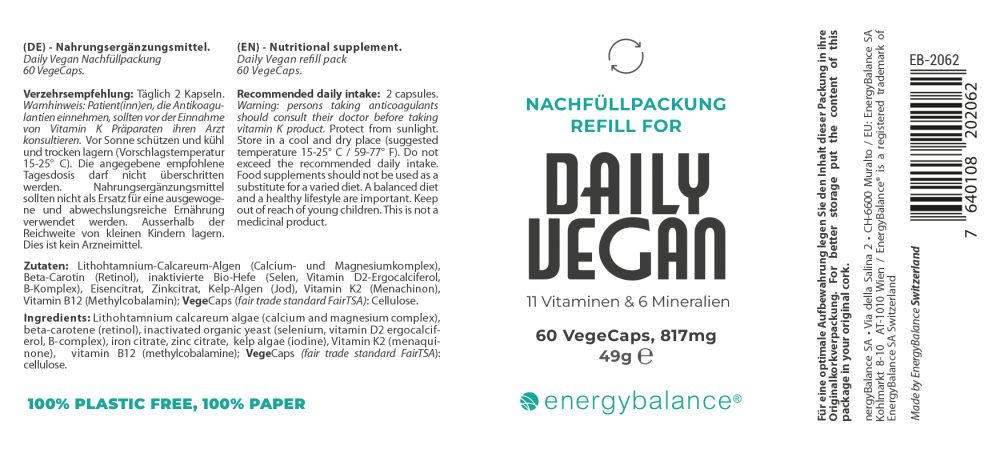Scientific health effects, confirmed by
EFSA* (European Food Safety Authority).
Iodine contributes to the normal growth of children
Biotin contributes to normal energy-yielding metabolism
Biotin contributes to normal functioning of the nervous system
Biotin contributes to normal macronutrient metabolism
Biotin contributes to normal psychological function
Biotin contributes to the maintenance of normal hair
Biotin contributes to the maintenance of normal mucous membranes
Biotin contributes to the maintenance of normal skin
Calcium contributes to normal blood clotting
Calcium contributes to normal energy-yielding metabolism
Calcium contributes to normal muscle function
Calcium contributes to normal neurotransmission
Calcium contributes to the normal function of digestive enzymes
Calcium has a role in the process of cell division and specialisation
Calcium is needed for the maintenance of normal bones
Calcium is needed for the maintenance of normal teeth
Iodine contributes to normal cognitive function
Iodine contributes to normal energy-yielding metabolism
Iodine contributes to normal functioning of the nervous system
Iodine contributes to the maintenance of normal skin
Iodine contributes to the normal production of thyroid hormones and normal thyroid function
Iron contributes to normal cognitive development of children
Iron contributes to normal cognitive function
Iron contributes to normal energy-yielding metabolism
Iron contributes to normal formation of red blood cells and haemoglobin
Iron contributes to normal oxygen transport in the body
Iron contributes to the normal function of the immune system
Iron contributes to the reduction of tiredness and fatigue
Iron has a role in the process of cell division
Magnesium contributes to electrolyte balance
Magnesium contributes to normal energy-yielding metabolism
Magnesium contributes to normal functioning of the nervous system
Magnesium contributes to normal muscle function
Magnesium contributes to normal protein synthesis
Magnesium contributes to normal psychological function
Magnesium contributes to the maintenance of normal bones
Magnesium contributes to the maintenance of normal teeth
Magnesium has a role in the process of cell division
Niacin contributes to normal energy-yielding metabolism
Niacin contributes to normal functioning of the nervous system
Niacin contributes to normal psychological function
Niacin contributes to the maintenance of normal mucous membranes
Niacin contributes to the maintenance of normal skin
Niacin contributes to the reduction of tiredness and fatigue
Pantothenic acid contributes to normal energy-yielding metabolism
Pantothenic acid contributes to normal mental performance
Pantothenic acid contributes to normal synthesis and metabolism of steroid hormones, vitamin D and some neurotransmitters
Pantothenic acid contributes to the reduction of tiredness and fatigue
Riboflavin contributes to normal energy-yielding metabolism
Riboflavin contributes to normal functioning of the nervous system
Riboflavin contributes to the maintenance of normal mucous membranes
Riboflavin contributes to the maintenance of normal red blood cells
Riboflavin contributes to the maintenance of normal skin
Riboflavin contributes to the maintenance of normal vision
Riboflavin contributes to the normal metabolism of iron
Riboflavin contributes to the protection of cells from oxidative stress
Riboflavin contributes to the reduction of tiredness and fatigue
Selenium contributes to normal spermatogenesis
Selenium contributes to the maintenance of normal hair
Selenium contributes to the maintenance of normal nails
Selenium contributes to the normal function of the immune system
Selenium contributes to the normal thyroid function
Selenium helps to protect the cells from oxidative stress
Supplemental folic acid intake increases maternal folate status. Low maternal folate status is a risk factor in the development of neural tube defects in the developing foetus

